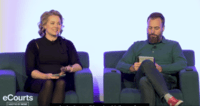Bridging the Justice Gap: Court and Nonprofit Partnerships in Legal Technology
Access to justice is a global challenge, but innovative solutions are emerging through collaboration between courts and nonprofits.
At the National Center for State Courts eCourts Conference, Jessica Frank (Free Law Project) and Sam Glover (Suffolk University Law School LitLab) delivered a powerful presentation exploring how these partnerships can leverage technology to make the legal system more accessible, inclusive, and effective.
We’re excited to share the full presentation with you – watch it to gain valuable insights into this critical topic.
Watch the Full Presentation
In this engaging conversation, Jessica and Sam highlighted the transformative power of partnerships between courts and nonprofits. They focused on creating and implementing tools like guided interviews and efiling solutions for self-represented litigants. Together, using technology, courts and nonprofits can develop and implement legal technology solutions to address systemic barriers to justice.
Why This Matters
Millions of people face obstacles to accessing justice due to the high costs of legal representation, complex procedures, and limited resources. Jessica and Sam emphasized:
- The scope of the access to justice gap: Courts and legal aid organizations face overwhelming demand, leaving many individuals without adequate legal assistance.
- Collaborative innovations: From online guided interviews to self-help filing tools, these partnerships are breaking down traditional barriers to justice.
- Sustainable impact: By working together, courts and nonprofits can design and deploy scalable solutions tailored to community needs.
Key Takeaways
- The power of partnerships: Combining the technical expertise of nonprofits with the procedural knowledge of courts creates stronger, more effective solutions.
- User-centered design: Tools like guided interviews empower individuals to navigate complex legal systems with confidence.
- Technology as an equalizer: These innovations are leveraging the playing field for self-represented litigants.
Dive Deeper into the Discussion
If you’re interested in learning more about the topics covered in this presentation or partnering with them, reach out to Jessica and Sam.

Jessica Frank: Learn more about Free Law Project and our work in legal innovation. (jessica@free.law)
Sam Glover: Explore additional tools and projects at Suffolk University Law School Legal Innovation and Technology Lab.
Join the Conversation
What are your thoughts on the ideas shared in this presentation? Have you encountered innovative court and nonprofit partnerships in your work or community? Reach out to us, we’d love to hear from you or share this post with your network to keep the conversation going.


